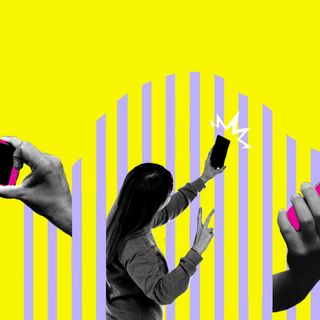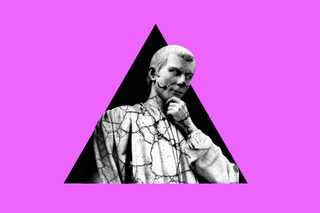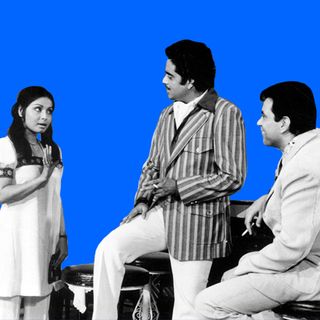
The ‘Dark Triad Theory,’ Debunked
One of the major criticisms of the dark triad theory is its potential to stigmatize people living with Cluster B personality disorders.

Those of us who engage with mental health accounts on Instagram and lurk on Reddit’s psychology forums have probably heard of the “dark triad theory.” Supposed to be a psychological theory of personality, the “dark triad”-personality consists of the traits of narcissism, psychopathy, and Machiavellianism, characterized by “manipulativeness, callousness, and indifference to morality.” The “dark tetrad” adds another trait to the mix: sadism. The alleged malevolent nature of these traits — like “extreme selfishness and taking advantage of others without empathy” — has earned them the adjective “dark,” forming the essence of the theory.
At first glance, it sounds about right. It doesn’t call to mind academic jargon villainizing living, breathing humans, nor does it seem to absolve many others of their violence, like Hitler. But that’s kind of what it is doing. A number of scholars and researchers have thus criticized the theory. They argue that the dark triad theory is a flawed and incomplete model that does not adequately explain human behavior; instead, it oversimplifies human personality traits. This oversimplification — performed by picking-and-choosing traits from a person’s overall personality — makes it easy to frame someone as inherently evil. As a pop-psychology buzzword, the dark triad theory has made its way into mental health discourse in troubling ways.
While the Dark Triad Theory has gained popularity in recent years, it is not without its criticisms. The lack of a clear definition of each trait, the focus on negative aspects of behavior, the failure to consider cultural and social factors, the limited explanatory power, and the potential for stigmatization all raise questions about the validity and usefulness of this model. While it may be useful in some context, researchers and practitioners should be cautious in its application and interpretation.
“The situation is cause for real concern… [T]hese studies usually use only a handful of criteria to rate someone as, say, a narcissist, a Machiavellian, and a psychopath, whereas standard tests use dozens to justify even one of those designations,” Joshua Miller, an American psychologist and personality researcher, explains. “In addition… much of the dark triad work has been carried out on narrow groups such as undergraduates seeking course credits, leading to doubts about whether the results can be applied broadly, including to the workplace.”
Related on The Swaddle:
Amid India’s Mental Health Crisis, Godmen Conflate Depression With Lack of Spirituality
One of the major criticisms of the dark triad theory also stems from its potential to stigmatize individuals living with Cluster B personality disorders — a category that includes narcissistic personality disorder (NPD), borderline personality disorder (BPD), histrionic personality disorder (HPD), and antisocial personality disorder (ASPD), which are described as being “characterized by dramatic, overly emotional or unpredictable thinking or behavior.” Mental illnesses are already wild stigmatized in society, and among them, personality disorders are, perhaps, the most stigmatized.
Commenting on the myriad forms of stigma faced by individuals living with personality disorders, a 2016 study notes, “Public stigma manifests in a variety of forms, ranging from lack of eye contact to complete ostracization of an individual based on his or her membership in the stigmatized group. This public stigma becomes internalized into self-stigma if the person believes that negative societal attitudes imposed upon them are true, [which] might lead to low self-esteem, depression, or lack of motivation. An additional type of stigma, structural stigma, occurs when stigmatizing beliefs and attitudes lead to unfair social institutions and policies for the stigmatized group.”
NPD, for instance, is a valid mental health diagnosis that comes with its own set of struggles. Yet, in the age of social media, “narcissism” has become synonymous with abusive traits. Can a person diagnosed with NPD be abusive? Yes, indeed. But so can a person who isn’t living with NPD. Moreover, contrary to popular perception, an NPD diagnosis doesn’t automatically make an individual abusive.
Pointing out a flaw in the application of the theory, then, an article in Science explains: “A study might label someone a narcissist because they show high self-esteem, for example, even though many narcissistic attitudes — including a tendency to view others as rivals — are actually driven by low self-esteem.”
BPD, too — which is “among the most stigmatized of all personality disorders and is the most researched in terms of stigma,” according to the 2016 study — is often associated with violent behavior both by researchers and in pop culture. The latter isn’t surprising, but the worrisome factor, here, is that the former can be used to justify the stereotypical portrayals, causing further harm to an already stigmatized group. Shows like Crazy Ex-Girlfriend are attempting to address the stigma associated with personality disorders, but they’re heavily outnumbered by productions doing the exact opposite. As such, cluttering mental health spaces with stigma, too, prevents people from even accessing help while society simultaneously worsens their perception of themselves.
Related on The Swaddle:
How Kapil Dev Dismissing Mental Illnesses as Fads Actively Harms People
“I am aware there’s this idea that people with BPD are serial killers, and all sorts of obsessive, manipulative, ‘crazy,’ and a bunch of other things. I’m none of these things, but I do have BPD. In fact, forget being manipulative, I’m so naive I get played around, and even when I realize I’m being manipulated, I go with it because I have really low self-esteem… I had spent a long time running away from that diagnosis. It was somehow just easier not to have BPD, you know? I shared my diagnosis with a couple of my friends, and one of them went like: ‘Oh no, BPD has a bad rep!’ Things like these broke me because, on some level, I feared this response, and their reaction validated my worst fears about myself,” a woman with a BPD diagnosis told The Swaddle in 2021.
On the other hand, dark triad personality traits are also glamorized. “It’s potentially damaging when we start to glorify what are socially adverse behaviors and attitudes,” says Ernest O’Boyle, a professor in the department of management and entrepreneurship at the Kelley School of Business in the U.S. Speaking to Science, O’Boyle added that “many in the business community have become seduced by the idea — spread from flippant discussion in the research literature — that dark triad traits including psychopathy could have benefits, such as risk-taking, which can influence hiring decisions.” This indicates the impact of the irresponsible popularization of the dark triad theory on our actual day-to-day lives, where it can promote ableist stereotypes and, perhaps, even discrimination.
In an age where people with a limited understanding of mental health are quick to hand out diagnoses on social media, theories like the dark triad serve to dehumanize individuals living with certain traits. “[N]arcissists are still people suffering from a personality disorder, which both affect them and those around them. People with NPD must cope with intense, unstable emotions, [and] mood swings, [besides] struggl[ing] with insecurity and vulnerability in the face of criticism, and even shame. Showcasing narcissists as megalomaniacs rather than people in need of mental healthcare furthers the legend of the cool, unapproachable narcissist as something to aspire to, rather than something that showcases discrepancies in regular mental function,” Aditi Murti wrote in The Swaddle in 2019.
Not only that, but the theory’s emphasis on negative traits — that it deems “evil” — can overshadow other aspects of the personality of an individual bearing those traits, reducing them to just a “dark personality.” Further, classifying individuals as “dark” or “deviant” — merely on the basis of certain externally observed traits, and often, without any regard for their present and past socio-cultural circumstances — can also create a self-fulfilling prophecy, of sorts. Drilling into one’s mind that they are inherently flawed or meant to do evil deeds isn’t a great idea.
Devrupa Rakshit is an Associate Editor at The Swaddle. She is a lawyer by education, a poet by accident, a painter by shaukh, and autistic by birth. You can find her on Instagram @devruparakshit.
Related


Woe Is Me! “I’m Dating a Man, But I Want to Date a Woman Too. Is That Cheating?”
